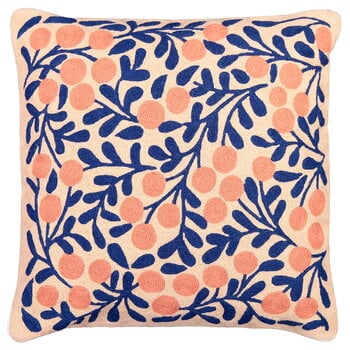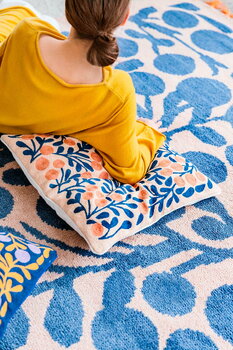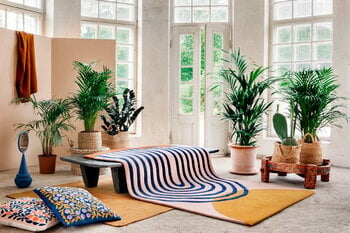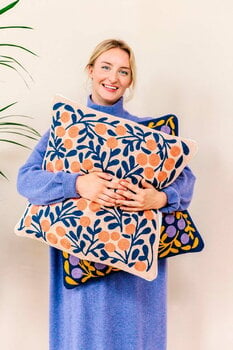Finarte's Terttu cushion cover, designed by Japanese Eri Shimatsuka, reflects the mystic atmosphere of Finnish forests, home to an abundance of wild berries. The embroidered cushion cover is a fascinating combination of luxurious materials and a distinctly bohemian pattern. The Terttu cushion cover celebrates the unique relations between Finland and Japan, drawing inspiration from themes valued in both countries: nature, traditional handcrafts and the beauty found in everyday life. Inner cushion sold separately.
Terttu cushion cover, beige
Finarte
Description
Finarte's Terttu cushion cover, designed by Japanese Eri Shimatsuka, reflects the mystic atmosphere of Finnish forests, home to an abundance of wild berries. The embroidered cushion cover is a fascinating combination of luxurious materials and a distinctly bohemian pattern. The Terttu cushion cover celebrates the unique relations between Finland and Japan, drawing inspiration from themes valued in both countries: nature, traditional handcrafts and the beauty found in everyday life. Inner cushion sold separately.
Product details (7)
- Material
- Wool, cotton
- Colour
- Beige, dark blue, orange
- Length
- 50 cm
- Width
- 50 cm
- Weight
- 0.25 kg
- Care instructions
- Gentle wash
- Notes
- Inner cushion sold separately.
- Product ID
Designer
Eri Shimatsuka is a Tokyo-born textile designer who moved to Finland in 2007. Shimatsuka has studied textile art at Helsinki’s Aalto University, and worked for brands such as Marimekko and Lapuan Kankurit. Besides print design, her work includes illustrations, book projects and translations.
View all productsReviews (2)
5
Based on 2 reviews
-
Y
Yuko J
Hong Kong
The product was just as it’s shown on the site, and together with my other order of another cushion cover and a side table, all came amazingly fast. Unfortunately some products cost too much to get sent to where we live, but your site is always in my first choice yo look at when we look for a Scandinavian design.
257 days ago
-
J
Jutta R
Berlin, Germany
333 days ago
Sustainability
The Product Sustainability Framework, our criteria of sustainable design, helps you find the most sustainable products in our selection. Read below which sustainability criteria this product has met.
Working conditions & labour 7/9
-
Equal opportunities for all employees
-
Commitment to UN Global Compact, fair compensation for all employees
-
Corporate responsibility requirements defined and communicated for suppliers
-
Systematic work for improved inclusion and well-being in the workplace
-
Transparent supply chain
-
Suppliers' compliance to a code of conduct ensured
-
Support for community involvement in the supply chain
-
Direct suppliers audited and certified
-
Compliance to the UN Guiding Principles on Business and Human Rights ensured in the supply chain
Eco-friendly production 6/9
-
Fair and resource-wise water-use in production
-
No incineration or landfilling of returned items
-
No use of endangered species as materials
-
No direct environmental emissions or waste (excl. GHGs) from production
-
Material-efficient and ecological packaging
-
No potentially harmful chemicals used in own production
-
The sustainability of direct suppliers' production is addressed and monitored
-
Production and material sourcing that respect biodiversity, animal rights, and natural ecosystems
-
Positive impact on nature’s well-being through operations that regenerate natural ecosystems
Climate impact 4/8
-
Company's direct greenhouse gas emissions identified and commitment to reduction
-
Product's carbon impact identified and commitment to reduction
-
Guidance on energy- and eco-efficient use of the product
-
Carbon footprint of the product calculated and goals set to reduce it
-
Contribution to climate initiatives beyond the brand’s direct operations
-
Low-carbon or compensated transportation
-
100 % renewable energy in own production and operations
-
Carbon neutral or carbon negative product
Sustainable materials 5/6
-
Sustainable and long-lasting material choices
-
No harmful or hazardous substances
-
Responsible raw material sourcing and production
-
Materials suited for circularity: monomaterials, recyclable finishings, renewable or recycled contents etc.
-
Ecological materials: natural, biodegradable, recyclable or recycled contents
-
Outstanding materials in terms of innovativeness, responsibility, sustainability and circularity: local production or sourcing, 100 % recycled content, C2C-certification etc.
Circular design 5/5
-
High aesthetic quality promoting long-term use of the product
-
Technically durable product design and material choices
-
Design for enduring life-long quality
-
Design and support for product maintenance, repair and upgradability
-
Innovative circular design solutions: circular service system, resale platform, remanufacturing, collection of used products, etc.











